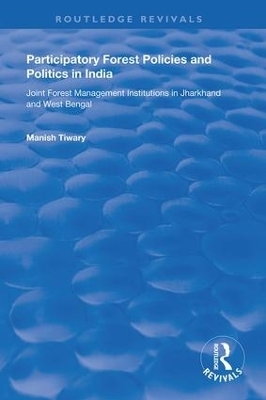
Participatory Forest Policies and Politics in India
Joint Forest Management Institutions in Jharkhand and West Bengal
Seiten
2020
Routledge (Verlag)
978-1-138-62014-8 (ISBN)
Routledge (Verlag)
978-1-138-62014-8 (ISBN)
Originally published in 2004, this volume examines India's Joint Forest Management (JFM) policy resolution, highlighting how state bureaucracy, local institutions and NGOs attempt to achieve the multiple goals of meeting subsistence needs, rural equity, sustainable forestry practices, and forest cover conservation.
Originally published in 2004. In a radical breakaway from colonial and postcolonial policies that were based on centralized and revenue-orientated control of forests, the government of India announced the Joint Forest Management (JFM) policy resolution in 1990. JFM promised important managerial concessions, including share in cash profit from the timber harvest to forest citizens, in exchange for management of state-owned forests. The government also asked the Forest Departments to invite village councils and NGOs to take part in the joint forest management schemes. Over a decade since its inception this volume examines the JFM, highlighting how state bureaucracy, local institutions and NGOs attempt to achieve the multiple goals of meeting subsistence needs, rural equity, sustainable forestry practices, and forest cover conservation. Investigating four institutions - village-based forest protection groups, the Forest Department, village councils, and NGOs - across the States of Jharkhand and West Bengal, the book focuses on forest citizens and how they interact with other JFM institutions. In doing so, it challenges notions of assumed virtues of moral economy and romanticized views of gender and indigenous knowledge and practices. The monograph also raises issues of social capital (local history, politics and leadership), common property resource (CPR) management and incentives for participation. While pointing out various inconsistencies that exist in the participatory forest framework, the book also shows the potential of JFM and suggests future directions forest management should take in India and elsewhere.
Originally published in 2004. In a radical breakaway from colonial and postcolonial policies that were based on centralized and revenue-orientated control of forests, the government of India announced the Joint Forest Management (JFM) policy resolution in 1990. JFM promised important managerial concessions, including share in cash profit from the timber harvest to forest citizens, in exchange for management of state-owned forests. The government also asked the Forest Departments to invite village councils and NGOs to take part in the joint forest management schemes. Over a decade since its inception this volume examines the JFM, highlighting how state bureaucracy, local institutions and NGOs attempt to achieve the multiple goals of meeting subsistence needs, rural equity, sustainable forestry practices, and forest cover conservation. Investigating four institutions - village-based forest protection groups, the Forest Department, village councils, and NGOs - across the States of Jharkhand and West Bengal, the book focuses on forest citizens and how they interact with other JFM institutions. In doing so, it challenges notions of assumed virtues of moral economy and romanticized views of gender and indigenous knowledge and practices. The monograph also raises issues of social capital (local history, politics and leadership), common property resource (CPR) management and incentives for participation. While pointing out various inconsistencies that exist in the participatory forest framework, the book also shows the potential of JFM and suggests future directions forest management should take in India and elsewhere.
Manish Tiwary
Contents: Political ecology and India's forests; Participatory forest management: the context of Jharkhand and West Bengal; Forest departments: changed roles, conventional goals; Forest protection committees: Forestry within the JFM boundaries; Voluntary forest protection groups: Indigenous beliefs, autogenous management; Panchayat and community forest protection groups: equity and institutional compliance in rural development forestry; Putting voluntarism to the test: case studies of NGOs in Bengal and Jharkhand; Conclusion: role of ecological institutions in participatory forest management; Bibliography; Appendices; Index.
| Erscheinungsdatum | 16.12.2020 |
|---|---|
| Reihe/Serie | Routledge Revivals |
| Verlagsort | London |
| Sprache | englisch |
| Maße | 156 x 234 mm |
| Gewicht | 453 g |
| Themenwelt | Naturwissenschaften ► Geowissenschaften ► Geografie / Kartografie |
| Sozialwissenschaften | |
| ISBN-10 | 1-138-62014-9 / 1138620149 |
| ISBN-13 | 978-1-138-62014-8 / 9781138620148 |
| Zustand | Neuware |
| Haben Sie eine Frage zum Produkt? |
Mehr entdecken
aus dem Bereich
aus dem Bereich
über eine faszinierende Welt zwischen Wasser und Land und warum sie …
Buch | Hardcover (2023)
dtv (Verlag)
24,00 €
von Mysterys, Rätseln und Lösungen
Buch | Softcover (2024)
Conrad Stein (Verlag)
10,90 €


